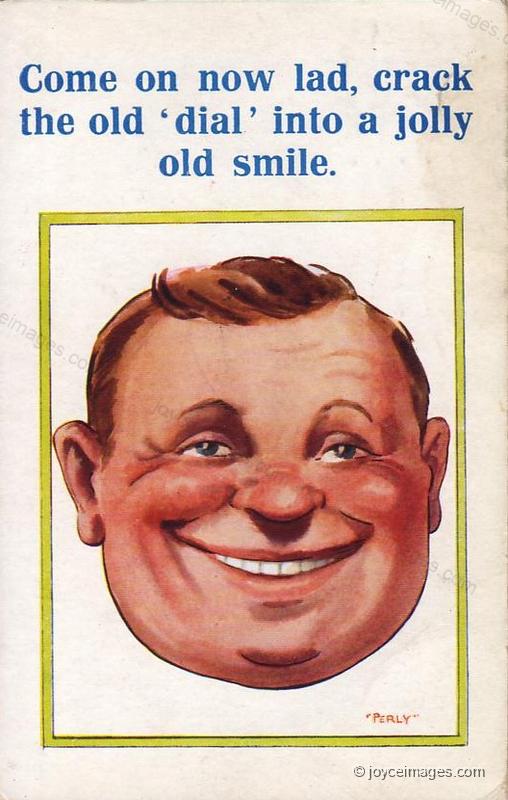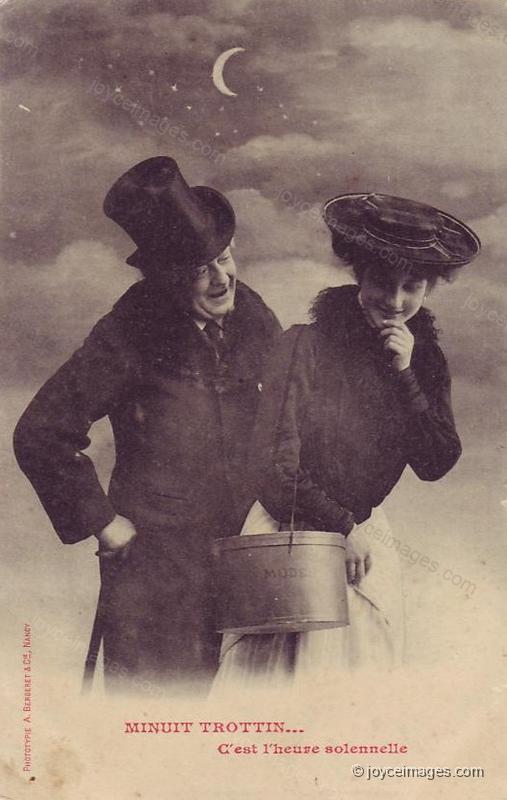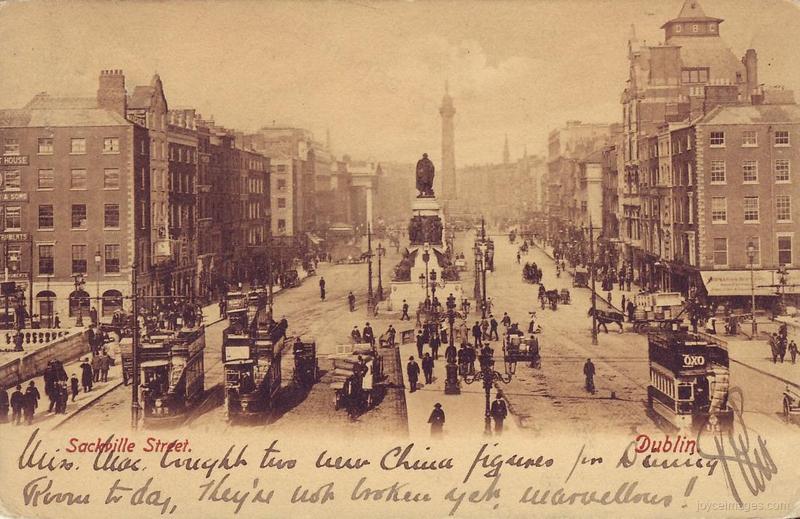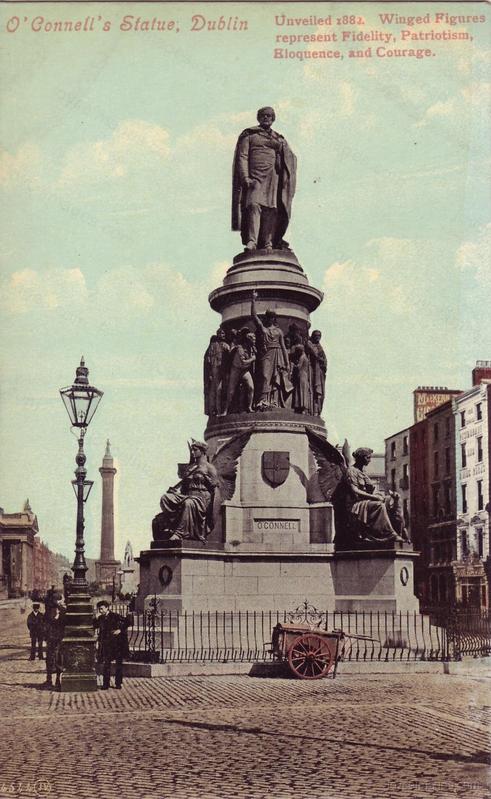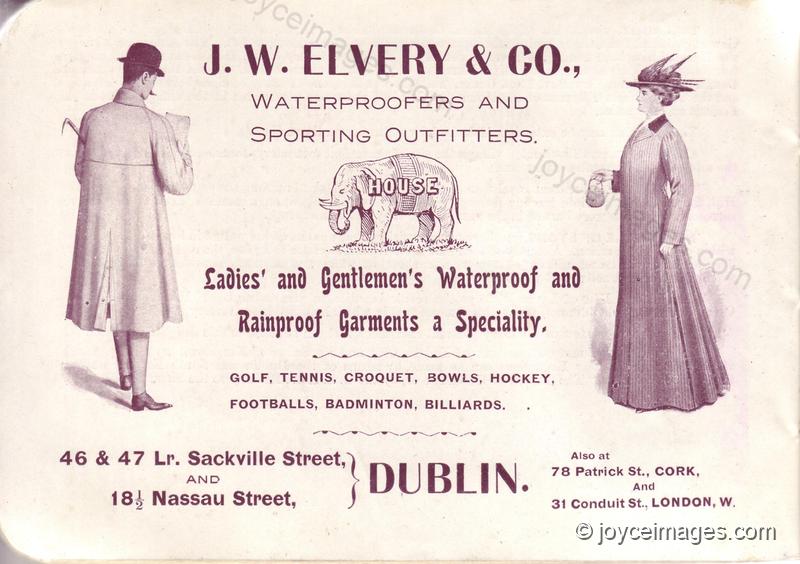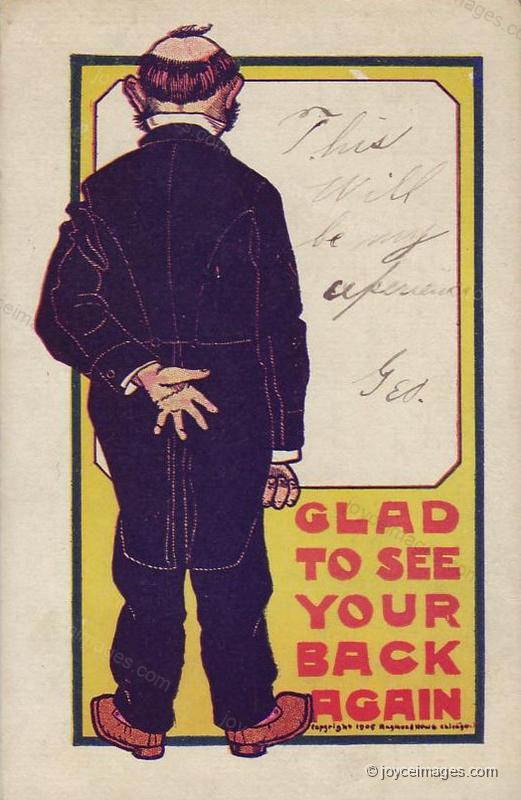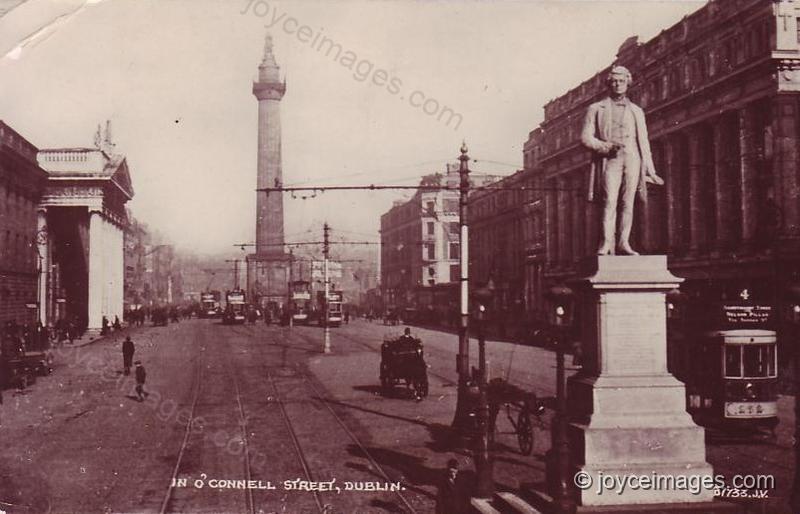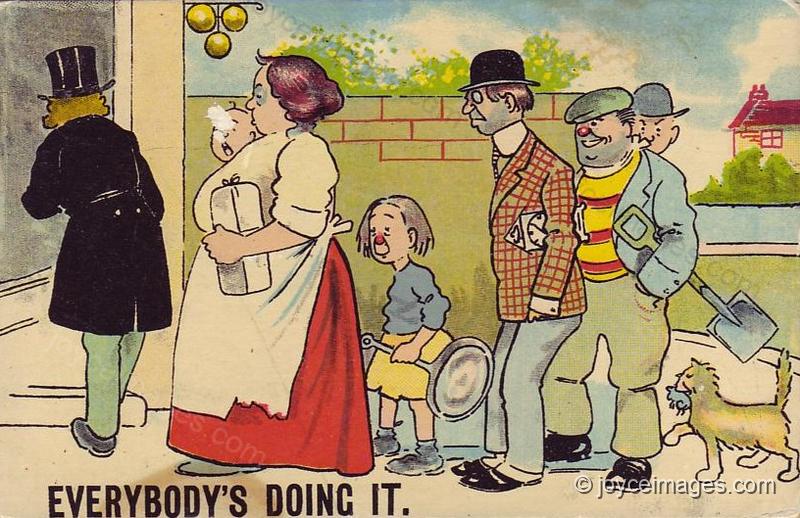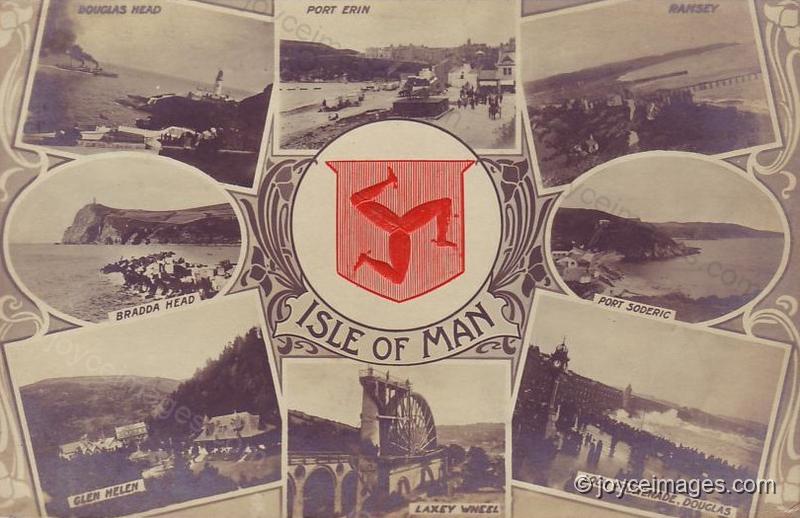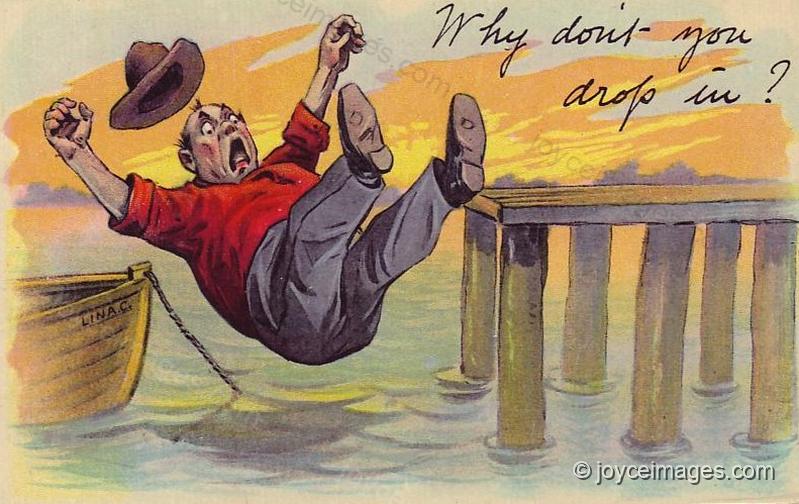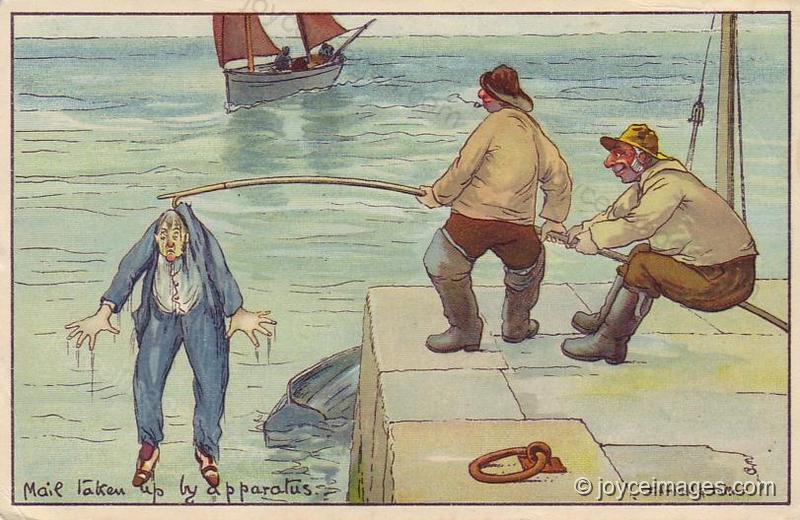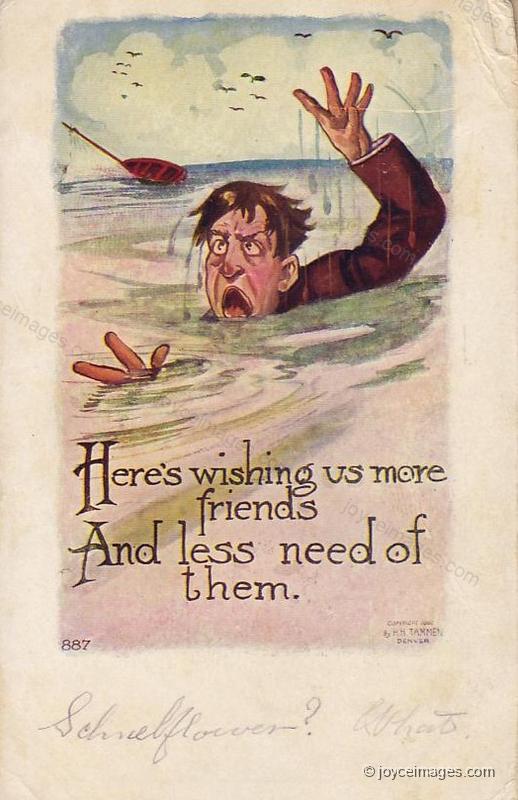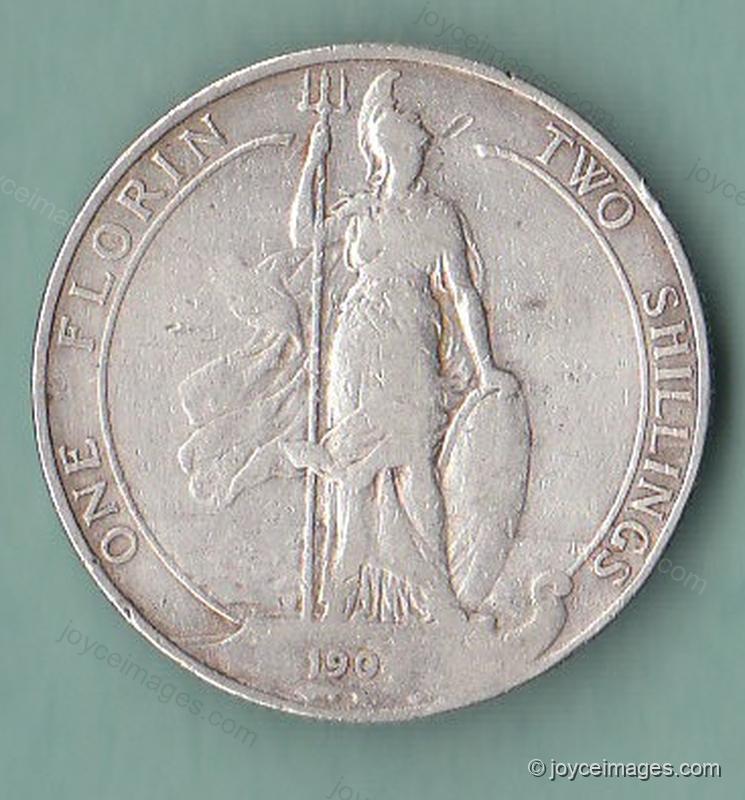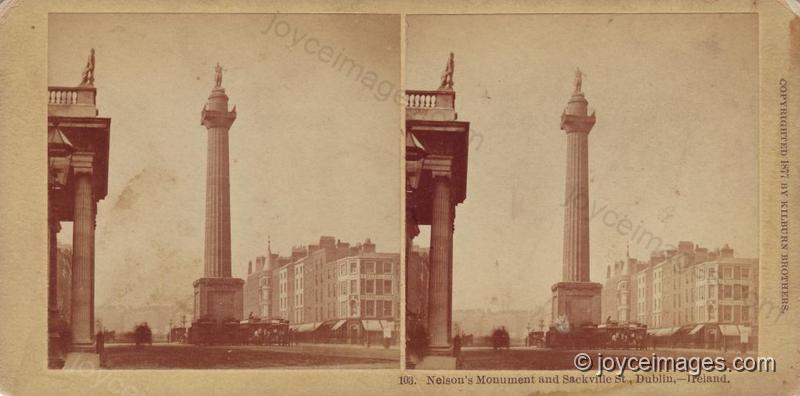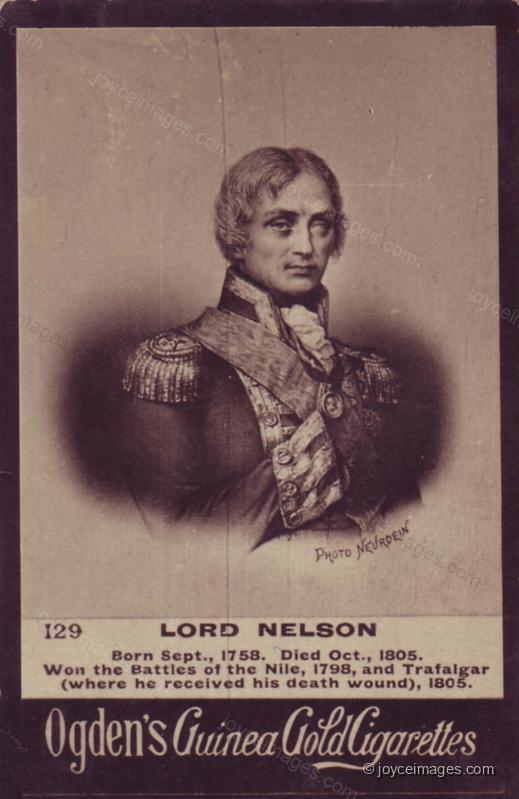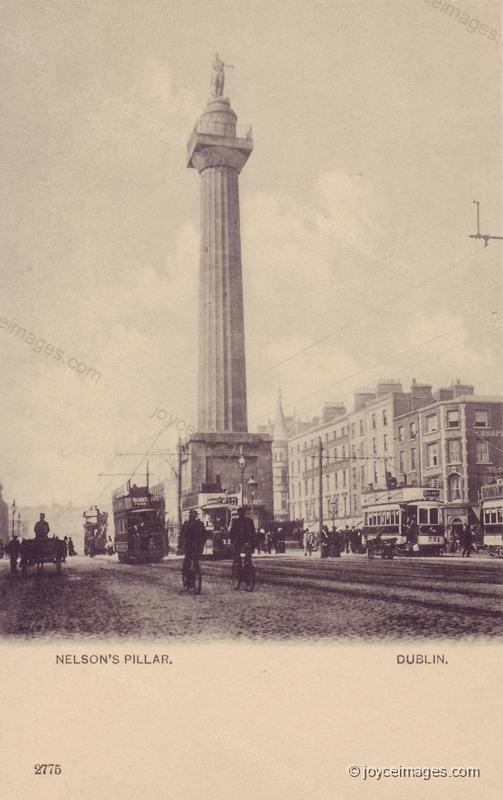"Madame: smiling. I smiled back. A smile goes a long way. Only politeness perhaps. Nice fellow." (U6.243)
"Who knows is that true about the woman he keeps? Not pleasant for the wife. Yet they say, who was it told me, there is no carnal. You would imagine that would get played out pretty quick. Yes, it was Crofton met him one evening bringing her a pound of rumpsteak. What is this she was? Barmaid in Jury's. Or the Moira, was it?" (U16.244)
"under the hugecloaked Liberator's form." (U6.249)
The Liberator is Daniel O'Connell (1775 - 1847). Huge indeed, the bronze statue of O'Connell wrapped in his cloak is 12 feet high, and the overall monument 40 feet high. It is still a major Dublin landmark. The PC reads: "Unveiled 1882. Winged Figures represent Fidelity, Patriotism, Eloquence, and Courage."
The Liberator is Daniel O'Connell (1775 - 1847). Huge indeed, the bronze statue of O'Connell wrapped in his cloak is 12 feet high, and the overall monument 40 feet high. It is still a major Dublin landmark. The PC reads: "Unveiled 1882. Winged Figures represent Fidelity, Patriotism, Eloquence, and Courage."
"A tall blackbearded figure, bent on a stick, stumping round the corner of Elvery's elephant house" (U6.252)
A period advertisement for J.W. Elvery & Co. (Waterproofers and Sporting Outfitters). Their logo was an elephant. They had stores at 46 & 47 Lower Sackville street, and 18 1/2 Nassau street. The carriage is going by the Lower Sackville branch.
A period advertisement for J.W. Elvery & Co. (Waterproofers and Sporting Outfitters). Their logo was an elephant. They had stores at 46 & 47 Lower Sackville street, and 18 1/2 Nassau street. The carriage is going by the Lower Sackville branch.
"showed them a curved hand open on his spine.
- In all his pristine beauty, Mr Power said.
Mr Dedalus looked after the stumping figure and said mildly:
- The devil break the hasp of your back!" (U6.253)
- In all his pristine beauty, Mr Power said.
Mr Dedalus looked after the stumping figure and said mildly:
- The devil break the hasp of your back!" (U6.253)
"Mr Power, collapsing in laughter, shaded his face from the window as the carriage passed Gray's statue." (U6.257)
"- We have all been there, Martin Cunningham said broadly.
His eyes met Mr Bloom's eyes. He caressed his beard, adding:
- Well, nearly all of us.
Mr Bloom began to speak with sudden eagerness to his companions' faces.
— That's an awfully good one that's going the rounds about Reuben J and the son.
— About the boatman? Mr Power asked.
— Yes. Isn't it awfully good?
— What is that? Mr Dedalus asked. I didn't hear it." (U6.259)
His eyes met Mr Bloom's eyes. He caressed his beard, adding:
- Well, nearly all of us.
Mr Bloom began to speak with sudden eagerness to his companions' faces.
— That's an awfully good one that's going the rounds about Reuben J and the son.
— About the boatman? Mr Power asked.
— Yes. Isn't it awfully good?
— What is that? Mr Dedalus asked. I didn't hear it." (U6.259)
"- There was a girl in the case, Mr Bloom began, and he determined to send him to the Isle of Man out of harm's way but when they were both...
- What? Mr Dedalus asked. That confirmed bloody hobbledehoy is it?
- Yes, Mr Bloom said. They were both on the way to the boat and he tried to drown...
- Drown Barabbas! Mr Dedalus cried. I wish to Christ he did!" (U6.269)
- What? Mr Dedalus asked. That confirmed bloody hobbledehoy is it?
- Yes, Mr Bloom said. They were both on the way to the boat and he tried to drown...
- Drown Barabbas! Mr Dedalus cried. I wish to Christ he did!" (U6.269)
"Mr Power sent a long laugh down his shaded nostrils.
- No, Mr Bloom said, the son himself...
Martin Cunningham thwarted his speech rudely:
- Reuben J and the son were piking it down the quay next the river on their way to the Isle of Man boat and the young chiseller suddenly got loose and over the wall with him into the Liffey." (U6.275)
- No, Mr Bloom said, the son himself...
Martin Cunningham thwarted his speech rudely:
- Reuben J and the son were piking it down the quay next the river on their way to the Isle of Man boat and the young chiseller suddenly got loose and over the wall with him into the Liffey." (U6.275)
"- For God' sake! Mr Dedalus exclaimed in fright. Is he dead?
- Dead! Martin Cunningham cried. Not he! A boatman got a pole and fished him out by the slack of the breeches and he was landed up to the father on the quay. More dead than alive. Half the town was there." (U6.281)
- Dead! Martin Cunningham cried. Not he! A boatman got a pole and fished him out by the slack of the breeches and he was landed up to the father on the quay. More dead than alive. Half the town was there." (U6.281)
"- Yes, Mr Bloom said. But the funny part is...
- And Reuben J, Martin Cunningham said, gave the boatman a florin for saving his son's life.
A stifled sigh came from under Mr Power's hand." (U6.285)
- And Reuben J, Martin Cunningham said, gave the boatman a florin for saving his son's life.
A stifled sigh came from under Mr Power's hand." (U6.285)
"- O, he did, Martin Cunningham affirmed. Like a hero. A silver florin.
- Isn't it awfully good? Mr Bloom said eagerly.
- One and eightpence too much, Mr Dedalus said drily.
Mr Power's choked laugh burst quietly in the carriage." (U6.289)
- Isn't it awfully good? Mr Bloom said eagerly.
- One and eightpence too much, Mr Dedalus said drily.
Mr Power's choked laugh burst quietly in the carriage." (U6.289)
"Nelson's pillar." (U6.293)
The carriage is going up Sackville street. Nelson's pillar (erected 1808) demarcated Lower from Upper Sackville street. It was a granite Doric column topped by a statue of Lord Horatio Nelson in Portland stone, the work of sculptor Thomas Kirk from Cork. It is seen here in a SV from 1877.
The carriage is going up Sackville street. Nelson's pillar (erected 1808) demarcated Lower from Upper Sackville street. It was a granite Doric column topped by a statue of Lord Horatio Nelson in Portland stone, the work of sculptor Thomas Kirk from Cork. It is seen here in a SV from 1877.
Lord Horatio Nelson (1758 - 1805) was an English admiral famous for his participation in the Napoleonic Wars, notably the Battle of Trafalgar where he lost his life. Nelson's pillar was from the outset very unpopular with the Irish, being a reminder of British imperialism in Dublin. Dublin City Council had originally rejected the project for the pillar, but was overruled by the Duke of Richmond, the British Lord Lieutenant.
"- Eight plums a penny! Eight for a penny!
- We had better look a little serious, Martin Cunningham said.
Mr Dedalus sighed.
- Ah, then indeed, he said, poor little Paddy wouldn't grudge us a laugh. Many a good one he told himself." (U6.294)
In 1904, Nelson's pillar was both a tram terminus and a common meeting place for Dubliners. On this PC, one of the trams has 'Dalkey' as its destination, and another advertises 'Neave's food' that Bloom was seen buying during Molly's pregnancy. Nelson's pillar was blown by republicans in 1966. In its place now stands the Millennium Spire.
- We had better look a little serious, Martin Cunningham said.
Mr Dedalus sighed.
- Ah, then indeed, he said, poor little Paddy wouldn't grudge us a laugh. Many a good one he told himself." (U6.294)
In 1904, Nelson's pillar was both a tram terminus and a common meeting place for Dubliners. On this PC, one of the trams has 'Dalkey' as its destination, and another advertises 'Neave's food' that Bloom was seen buying during Molly's pregnancy. Nelson's pillar was blown by republicans in 1966. In its place now stands the Millennium Spire.
